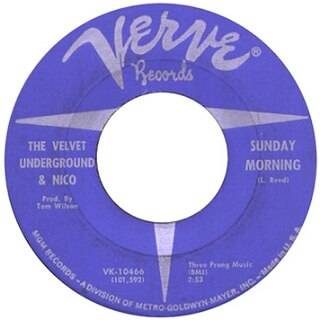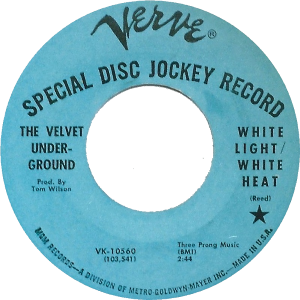Related Research Articles

The Velvet Underground is the third studio album by American rock band the Velvet Underground. Released in March 1969 by MGM Records, it was their first record with Doug Yule who replaced previous member John Cale. Recorded in 1968 at TTG Studios in Los Angeles, California, the album's sound—consisting largely of ballads and straightforward rock songs—marked a notable shift in style from the band's previous recordings. Lead vocalist Lou Reed intentionally did this as a result of their abrasive previous studio album White Light/White Heat (1968). Reed wanted other band members to sing on the album; Yule contributed lead vocals to some tracks and closing track "After Hours" is sung by drummer Moe Tucker.

White Light/White Heat is the second studio album by American rock band the Velvet Underground. Released on January 30, 1968, on Verve Records, it was the band's last studio recording with multi-instrumentalist and founding member John Cale. Recorded after Reed fired Andy Warhol, who had produced their debut album The Velvet Underground & Nico, they hired Steve Sesnick as a manager and hired producer Tom Wilson who had worked on the band's debut. White Light/White Heat was engineered by Gary Kellgren.

Peel Slowly and See is a five-disc box set of material by the Velvet Underground. It was released in September 1995 by Polydor.

Holmes Sterling Morrison Jr. was an American guitarist, best known as one of the founding members of the rock group the Velvet Underground, usually playing electric guitar, occasionally bass guitar, and singing backing vocals.

The Very Best of The Velvet Underground is a compilation album by The Velvet Underground. It was released in Europe on March 31, 2003, by Polydor, the record label that oversees the band's Universal Music Group back catalog.

Squeeze is the fifth and final studio album by The Velvet Underground, recorded in the autumn of 1971 and released in Feb 1973 by Polydor Records. The album features Doug Yule from the Lou Reed-era lineup of the group, who wrote and recorded the album almost entirely by himself. Yule had joined the Velvet Underground in October 1968, prior to the band recording their self-titled third album, and Yule had also contributed significantly to the fourth album, Loaded. Following the departures of the remaining founding members, Yule was positioned as the de facto leader of the band. Longtime drummer Maureen Tucker was slated to appear on Squeeze by Yule, but she was dismissed by the band's manager, Steve Sesnick.

Live MCMXCIII is a live album by the Velvet Underground. It was released simultaneously in single and double CD/cassette formats on October 26, 1993, by Sire Records, then DVD format on January 24, 2006. The single CD is an abridged version of the double CD edition, featuring tracks 2, 13–16, 5, 6, 9, 18, and 20–23 in that order. There are no different takes of songs across the multiple editions although the actual track times differ by a few seconds between releases.

Gold is a two-CD compilation album by the Velvet Underground. It was released for the North American market on June 14, 2005, by Polydor, the record label that oversees the band's Universal Music Group back catalogue.

VU is a 1985 album by the American musical group the Velvet Underground, a compilation album of outtakes recorded 1968-69. It was released in February 1985 by Verve Records.

Final V.U. 1971–1973 is a box set by the Velvet Underground, comprising live recordings from after founding members Lou Reed and Sterling Morrison had left the group. It was released by Japanese record company Captain Trip Records in August 2001.

The Best of The Velvet Underground: Words and Music of Lou Reed is a compilation album by The Velvet Underground. It was released in October 1989 by Verve Records.

Live at Max's Kansas City is a live album by the Velvet Underground recorded at the famous nightclub and restaurant at 213 Park Avenue South in New York City. It was originally released on May 30, 1972, by Cotillion, a subsidiary label of Atlantic Records.
"Sister Ray" is a song by the Velvet Underground that closes side two of their 1968 album White Light/White Heat. The lyrics are by Lou Reed, with music composed by John Cale, Sterling Morrison, Maureen Tucker and Reed.

"Femme Fatale" is a song by American rock band the Velvet Underground from their 1967 debut album The Velvet Underground & Nico, with lead vocals by Nico.
"Heroin" is a song by the Velvet Underground, released on their 1967 debut album The Velvet Underground & Nico. Written by Lou Reed in 1964, the song, which overtly depicts heroin abuse, is one of the band's most celebrated compositions. Critic Mark Deming of Allmusic writes, "While 'Heroin' hardly endorses drug use, it doesn't clearly condemn it, either, which made it all the more troubling in the eyes of many listeners." In 2004, it was ranked at number 448 on Rolling Stone's list of The 500 Greatest Songs of All Time, and was re-ranked at number 455 in 2010.
"Lady Godiva's Operation" is a song by the Velvet Underground from their second album, White Light/White Heat (1968). The lyrics of the first half of the song, sung by John Cale, describe Lady Godiva; the lyrics of the second half, sung by Cale alternating with Lou Reed, are full of oblique, deadpan black humor and describe a botched surgical procedure, implied to be a lobotomy. Cale plays electric viola while Sterling Morrison plays bass, an instrument that he disliked, despite his competent abilities.

"White Light/White Heat" is a song recorded by the American rock band the Velvet Underground. It was released in January 1968 as the title track on their second studio album of the same name. Also in January 1968, the song was released as a single with the B-side "Here She Comes Now".
"I'll Be Your Mirror" is a song by the Velvet Underground and Nico. It appeared on their 1967 debut album The Velvet Underground & Nico. It also surfaced as a single a year earlier with "All Tomorrow's Parties" in 1966.

"Here She Comes Now" is a song released by the American rock band the Velvet Underground in January 1968, from their second studio album White Light/White Heat. As the shortest song on the album, the performance and mix of the song are both considered simple and traditional, making it somewhat distinct from the other five songs on the album, all of which contain some degree of experimental or avant-garde elements in terms of sound.

The Velvet Underground was an American rock band formed in New York City in 1964. It originally comprised singer and guitarist Lou Reed, Welsh multi-instrumentalist John Cale, guitarist Sterling Morrison, and drummer Angus MacLise. MacLise was replaced by Moe Tucker in 1965, who played on most of the band's recordings. Though their integration of rock and the avant-garde achieved little commercial success, they became one of the most influential bands in rock, underground, experimental, and alternative music. Their provocative subject matter, musical experiments, and nihilistic attitude was also instrumental in the development of punk rock, new wave and several other genres.
References
- ↑ Carpenter, Troy. "The Velvet Underground Bio". Rolling Stone . Archived from the original on December 4, 2017. Retrieved December 16, 2018.
- ↑ Stanley, Bob (13 September 2013). "1975: Storm Warning". Yeah Yeah Yeah: The Story of Modern Pop. Faber & Faber. p. 422. ISBN 978-0-571-28198-5.
- ↑ Malitz, David (October 28, 2013). "Lou Reed and the single greatest second of recorded music in rock-and-roll history". The Washington Post. Retrieved February 23, 2015.
- ↑ Bockris, Victor (2003). Uptight: The Velvet Underground Story. Cooper Square Press. p. 89. ISBN 978-0815412854.